Francis Bacon 培根作品简介
Francis Bacon 培根作品简介

Francis Bacon and His WorksFrancis BaconFrancis Bacon(1561—1626)was one of the leading figures in natural philosophy and in the field of scientific methodology in the period of transition from the Renaissance to the early modern era.He studied at Cambridge (Trinity College) and Gray's Inn, entered Parliament, and gradually established his reputation, but made little progress during Elizabeth's reign.WorksFrancis Bacon left vast and varied writings, which might be divided into three great branches:Scientifical works — in which his ideas for an universal reform of knowledge, scientific method and the improvement of mankind's state are presented.Religious/literary works — in which he presents his moral philosophy and theological meditations. Juridical works — in which his reforms in Law are proposed.ContributionsFrancis Bacon had made great contributions on Literature, Philosophy, Science, law and art. Literature:Francis Bacon’s literatur al work mostly are proses and essays. There are some features of Bacon's essays: ①the language is very neat, pretty and weighty. ②the sentences are very short. Bacon also likes to use more co-ordinate conjunctions than the subordinated ones, such as "as, since, because". ③the devices are parallelism, epigrams(警句), metaphor,and simile.And his most important work is Essay, which was regarded as one of the greatest prose works in the world for its brevity, compactness and powerfulness. Essay covers a wide variety of subjects, such as love, truth, friendship, politics, economy, religion, beauty, studies, and marriage.Of TruthⅠ Brief Introduction●First published in 1625●Francis Bacon declares that truth in the philosophical and theological sense, as well as honesty in thecivil business sense, are the "sovereign good of human nature."Ⅱ Background Information“What is truth?” said jesting Pilate (Full name: Pontius Pilate)●According to the new testament scripture, at first, Pilate thinks Jesus is innocent, for he had questionedJesus for many times. But under the pressure of the jewish religious leaders, Jesus was sentenced to death.●In the conversation between Pilate and Jesus, Pilate asked,''what have you done?'' Then, Pilateasked:“What is truth?”●Actually Pilate knew Jesus was innocent but he still asked , “What is truth” . At that time a lot of peoplelike Pilate, they do know what is truth but they pretend they don’t know .●Bacon uses this Bible story to introduce his topic——truth. He wants to tell people what is truth andwhat attitude should we take towards truth.Ⅲ TopicThe inquiry of truth, which is the love-making or wooing of it, the knowledge of truth, which is the presence of it, and the belief of truth, which is the enjoying of it, is the sovereign good of human nature.Ⅳ Sentences Analysis1. “But it is not only the difficulty and labor, which men take in finding out of truth, nor again, that when it is found, it imposeth upon men's thoughts, that doth bring lies in favor; but a natural though corrupt love, of the lie itself.”●Up to this point Bacon is saying there are few philosophical skeptics left but humans still prefer thefreedom to choose their own views over the hard work of pursuing truth especially since they consider truth constricting.2. No advantageBacon writes “One of the later school of the Grecians, examineth the matter, and is at a stand, to think what should be in it, that men should love lies; where neither they make for pleasure, as with poets, nor for advantage, as with the merchant; but for the lie's sake.”3. AdvantagesBacon writes “A mixture of a lie doth ever add pleasure. Doth any man doubt, that if there were taken out of men's minds, vain opinions, flattering hopes, false valuations, imaginations as one would, and the like”4. DisadvantagesBacon writes “but it would leave the minds, of a number of men, poor shrunken things, full of melancholy and indisposition, and unpleasing to themselves?”5. “truth, which only doth judge itself, teacheth that the inquiry of truth, which is the love-making, or wooing of it,”●“yet truth, which only doth judge itself” means that “that truth seeking faculty is the sole judge of truth.”●In “the love-making, or wooing of it” Bacon means the happy match between the mind of man and thenature of things.”6. “The first creature of God, in the works of the days, was the light of the sense; the last, was the light of reason.”●Bacon believed that God gave us our senses to determine truth be he also believed God gave us theability to reason to determine truth.Ⅴ Beautiful Sentences1.But I cannot tell; this same truth, is a naked, and open day-light, that doth not show the masks, and mummeries, and triumphs, of the world, half so stately and daintily as candle-lights.余亦难言究竟,唯思真理犹如白日无遮之光,直照人世之歌舞庆典,不如烛光掩映,反能显其堂皇之美。
弗朗西斯·培根

弗朗西斯·培根
弗朗西斯·培根(Francis Bacon,1561年1月22日-1626年4月9日),英国文艺复兴时期著名的哲学家、政治家和作家。
他被认为是现代科学实证主义的奠基者之一,也
是英国启蒙运动的重要代表人物之一。
培根出生于英格兰,是伊丽莎白一世时期的律师、政治家和哲学家。
他接受了良好的
教育,曾在剑桥大学学习法律,后来又进入枢密院工作,并成为国王詹姆斯一世的国务大臣。
他曾任伦敦法学院院长、国王特许会计师和特许枢密院律师,因此在政治和法律领域
都有很高的地位。
作为哲学家和作家,培根以其丰富的学识和深厚的思想而闻名。
他的主要作品包括
《新工具》、《论谈》和《科學進攻》等。
他在这些著作中提出了自己独特的哲学观点,
主张通过实证方法来获取知识,并强调观察和实验在科学研究中的重要性。
他还对政治、
宗教和教育等问题进行了深刻的思考,对当时社会的发展和变革提出了许多有益的建议。
培根的科学哲学对后世产生了巨大的影响。
他的实证主义思想为现代科学方法论的发
展奠定了基础,启发了众多科学家和哲学家进行科学研究,并对人类的认识和理解产生了
深远的影响。
他也为政治和社会改革提供了许多有价值的思想,成为了英国启蒙运动的代
表人物之一。
弗朗西斯·培根是一位杰出的思想家和作家,他对科学、哲学和社会问题的深刻洞察
和独特见解使他成为了文艺复兴时期最杰出的人物之一,其影响力不仅限于他所处的时代,而是一直影响到了今天。
《培根随笔》简介
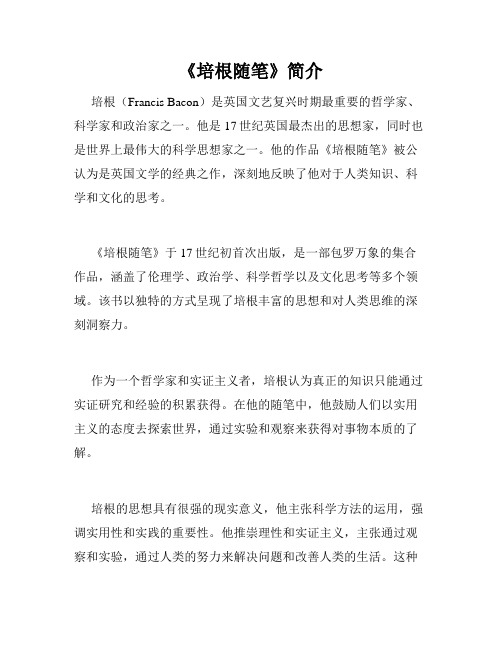
《培根随笔》简介培根(Francis Bacon)是英国文艺复兴时期最重要的哲学家、科学家和政治家之一。
他是17世纪英国最杰出的思想家,同时也是世界上最伟大的科学思想家之一。
他的作品《培根随笔》被公认为是英国文学的经典之作,深刻地反映了他对于人类知识、科学和文化的思考。
《培根随笔》于17世纪初首次出版,是一部包罗万象的集合作品,涵盖了伦理学、政治学、科学哲学以及文化思考等多个领域。
该书以独特的方式呈现了培根丰富的思想和对人类思维的深刻洞察力。
作为一个哲学家和实证主义者,培根认为真正的知识只能通过实证研究和经验的积累获得。
在他的随笔中,他鼓励人们以实用主义的态度去探索世界,通过实验和观察来获得对事物本质的了解。
培根的思想具有很强的现实意义,他主张科学方法的运用,强调实用性和实践的重要性。
他推崇理性和实证主义,主张通过观察和实验,通过人类的努力来解决问题和改善人类的生活。
这种思想对于当时的科学发展和人类文明的进步起到了积极的推动作用。
《培根随笔》的内容广泛而深刻,涉及政治、伦理、教育、科学等多个领域。
在政治方面,培根强调国家的发展离不开优秀的领导者和有效的政府管理。
他提出了政府应该聚焦于公共利益,以实际行动来服务于人民。
在伦理学方面,他探讨了个人道德行为和社会道德规范之间的关系,强调个人品德的重要性。
在教育方面,培根主张培养全面发展的人才,注重培养人的思辨能力和创新能力。
在科学方面,他强调实验方法的重要性,主张通过实验来验证和丰富人类的知识。
总的来说,《培根随笔》凝聚了培根丰富的思想和对人类生活的深刻思考,为人们提供了关于科学、伦理、教育和政治等重要领域的启示。
这本书不仅对于17世纪的英国文化产生了巨大的影响,也对后世的人类思想和文化发展产生了深远的影响。
尽管《培根随笔》的出版时间已经有几个世纪了,但其中的思想和观点仍然具有重要的现实意义。
作为读者,我们可以从中汲取智慧,启迪我们的思维,为我们的生活和社会做出积极的贡献。
培根随笔作品简介
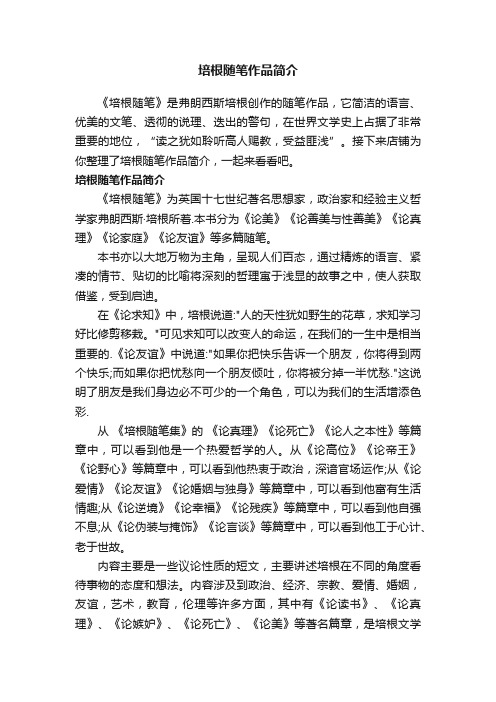
培根随笔作品简介《培根随笔》是弗朗西斯培根创作的随笔作品,它简洁的语言、优美的文笔、透彻的说理、迭出的警句,在世界文学史上占据了非常重要的地位,“读之犹如聆听高人赐教,受益匪浅”。
接下来店铺为你整理了培根随笔作品简介,一起来看看吧。
培根随笔作品简介《培根随笔》为英国十七世纪著名思想家,政治家和经验主义哲学家弗朗西斯·培根所着.本书分为《论美》《论善美与性善美》《论真理》《论家庭》《论友谊》等多篇随笔。
本书亦以大地万物为主角,呈现人们百态,通过精炼的语言、紧凑的情节、贴切的比喻将深刻的哲理寓于浅显的故事之中,使人获取借鉴,受到启迪。
在《论求知》中,培根说道:"人的天性犹如野生的花草,求知学习好比修剪移栽。
"可见求知可以改变人的命运,在我们的一生中是相当重要的.《论友谊》中说道:"如果你把快乐告诉一个朋友,你将得到两个快乐;而如果你把忧愁向一个朋友倾吐,你将被分掉一半忧愁."这说明了朋友是我们身边必不可少的一个角色,可以为我们的生活增添色彩.从《培根随笔集》的《论真理》《论死亡》《论人之本性》等篇章中,可以看到他是一个热爱哲学的人。
从《论高位》《论帝王》《论野心》等篇章中,可以看到他热衷于政治,深谙官场运作;从《论爱情》《论友谊》《论婚姻与独身》等篇章中,可以看到他富有生活情趣;从《论逆境》《论幸福》《论残疾》等篇章中,可以看到他自强不息;从《论伪装与掩饰》《论言谈》等篇章中,可以看到他工于心计、老于世故。
内容主要是一些议论性质的短文,主要讲述培根在不同的角度看待事物的态度和想法。
内容涉及到政治、经济、宗教、爱情、婚姻,友谊,艺术,教育,伦理等许多方面,其中有《论读书》、《论真理》、《论嫉妒》、《论死亡》、《论美》等著名篇章,是培根文学方面的代表作,语言简洁文笔优美,说理透彻,警句迭出,蕴含着培根的思想精华。
培根随笔作品名言人生只知哲学一些皮毛的人,思想会导向无神论。
培根随笔内容简介
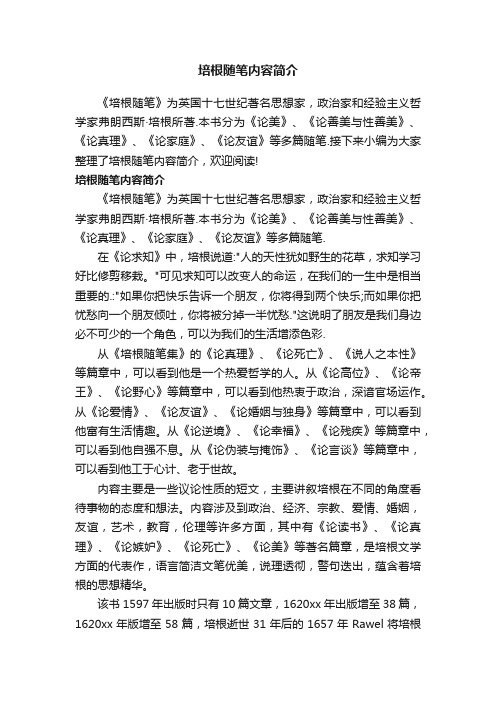
培根随笔内容简介《培根随笔》为英国十七世纪著名思想家,政治家和经验主义哲学家弗朗西斯·培根所著.本书分为《论美》、《论善美与性善美》、《论真理》、《论家庭》、《论友谊》等多篇随笔.接下来小编为大家整理了培根随笔内容简介,欢迎阅读!培根随笔内容简介《培根随笔》为英国十七世纪著名思想家,政治家和经验主义哲学家弗朗西斯·培根所著.本书分为《论美》、《论善美与性善美》、《论真理》、《论家庭》、《论友谊》等多篇随笔.在《论求知》中,培根说道:"人的天性犹如野生的花草,求知学习好比修剪移栽。
"可见求知可以改变人的命运,在我们的一生中是相当重要的.:"如果你把快乐告诉一个朋友,你将得到两个快乐;而如果你把忧愁向一个朋友倾吐,你将被分掉一半忧愁."这说明了朋友是我们身边必不可少的一个角色,可以为我们的生活增添色彩.从《培根随笔集》的《论真理》、《论死亡》、《说人之本性》等篇章中,可以看到他是一个热爱哲学的人。
从《论高位》、《论帝王》、《论野心》等篇章中,可以看到他热衷于政治,深谙官场运作。
从《论爱情》、《论友谊》、《论婚姻与独身》等篇章中,可以看到他富有生活情趣。
从《论逆境》、《论幸福》、《论残疾》等篇章中,可以看到他自强不息。
从《论伪装与掩饰》、《论言谈》等篇章中,可以看到他工于心计、老于世故。
内容主要是一些议论性质的短文,主要讲叙培根在不同的角度看待事物的态度和想法。
内容涉及到政治、经济、宗教、爱情、婚姻,友谊,艺术,教育,伦理等许多方面,其中有《论读书》、《论真理》、《论嫉妒》、《论死亡》、《论美》等著名篇章,是培根文学方面的代表作,语言简洁文笔优美,说理透彻,警句迭出,蕴含着培根的思想精华。
该书1597年出版时只有10篇文章,1620xx年出版增至38篇,1620xx年版增至58篇,培根逝世31年后的1657年Rawel将培根未完成的随笔《论谣言》作为第59篇收入最终构成了今天流行的版本。
培根散文选
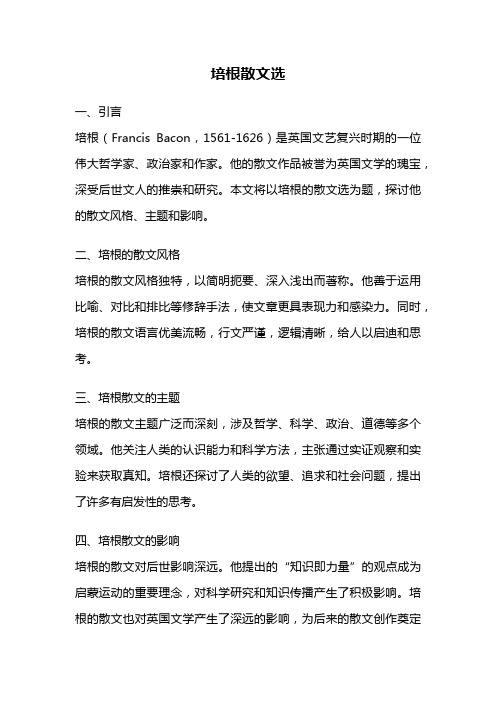
培根散文选一、引言培根(Francis Bacon,1561-1626)是英国文艺复兴时期的一位伟大哲学家、政治家和作家。
他的散文作品被誉为英国文学的瑰宝,深受后世文人的推崇和研究。
本文将以培根的散文选为题,探讨他的散文风格、主题和影响。
二、培根的散文风格培根的散文风格独特,以简明扼要、深入浅出而著称。
他善于运用比喻、对比和排比等修辞手法,使文章更具表现力和感染力。
同时,培根的散文语言优美流畅,行文严谨,逻辑清晰,给人以启迪和思考。
三、培根散文的主题培根的散文主题广泛而深刻,涉及哲学、科学、政治、道德等多个领域。
他关注人类的认识能力和科学方法,主张通过实证观察和实验来获取真知。
培根还探讨了人类的欲望、追求和社会问题,提出了许多有启发性的思考。
四、培根散文的影响培根的散文对后世影响深远。
他提出的“知识即力量”的观点成为启蒙运动的重要理念,对科学研究和知识传播产生了积极影响。
培根的散文也对英国文学产生了深远的影响,为后来的散文创作奠定了基础。
五、培根散文的代表作品1.《论学问》:培根在这篇散文中探讨了学问的本质和目的,提出了实证主义的观点,强调实践和实验的重要性。
2.《真理之镜》:这是培根的一篇科学哲学散文,他在文章中阐述了观察和实验的重要性,强调科学研究应该基于客观事实。
3.《论富贵》:这篇散文探讨了财富和地位对人们的影响,培根主张追求真正的内在价值和品质,而非物质的追求。
4.《论友谊》:培根在这篇散文中讨论了友谊的意义和价值,他认为真正的友谊应该建立在互相尊重和信任的基础上。
5.《论德行》:这篇散文探讨了德行的重要性和人类行为的道德准则,培根呼吁人们要追求高尚的品德和道德行为。
六、结语培根的散文选是英国文学的珍宝,他的散文风格简明扼要、思想深刻,对后世的影响深远。
通过研究培根的散文,我们可以更好地理解他的思想和观点,从中汲取智慧和启示。
培根的散文选是一部值得阅读和研究的经典之作。
战后最有争议画家丨弗朗西斯·培根高清作品集

战后最有争议画家丨弗朗西斯·培根高清作品集弗朗西斯·培根Francis Bacon1909年10月28日-1992年4月28日弗朗西斯·培根(Francis Bacon,1909-1992年),是一位生于爱尔兰的英国画家。
其作品以粗犷,犀利,具强烈暴力与噩梦般的图像著称,他扭曲、变形和模糊的人物画使他成为战后最有争议的画家之一。
培根出生于爱尔兰都柏林一个英格兰人家庭。
16岁时他离开家,居于柏林和巴黎,直到1929年定居伦敦开始接触油画,同时不断实验水彩画与素描。
在此期间的作品有机而怪异,具有超现实主义的特色,不过一直都默默无闻。
1943年一1944年,由于身体的原因而不能服军役。
培根把所有精力都放在绘画活动上,成为了一名职业的画家。
他是自学成才的画家。
他的早期作品受到超现实主义的影响。
1945年当他的三联画《三张十字架底下人物的素描》在伦敦展出后,他受到了广泛注意。
培根几乎全靠自学,运用多变的技法表现各种恐怖、愤怒和兴奋的形象。
他最擅长运用粗犷强劲的笔触来表现画面中人物的恐怖、荒蛮、孤寂、兴奋和愤怒。
培根的笔触中隐含着内心的想象和情绪,虽然人物的形象被肢解甚至扭曲,但依然保持着可以辨认的形象。
在培根的笔下,形象不再是再现的重复,而是向人们展现了命运真实的面目。
培根形容自己的作品是“试图把某种情绪形象化”。
他喜欢表现孤独和苦恼的主题。
他所绘制的人物在画面上变成了令人不适一种恐怖,巨大的苦痛感撞击着观者的心灵。
正是这种敢于直视内心感受,毫不介意地表现在公众视野当中,引起了人们的内心关注,也让当时的画坛为之震撼。
人们把他的作品与戈雅的奇妙作品相媲美。
自从培根死后,其声誉与知名度逐步提高。
他的作品获得大众的敬仰和等量的排斥。
Francis bacon
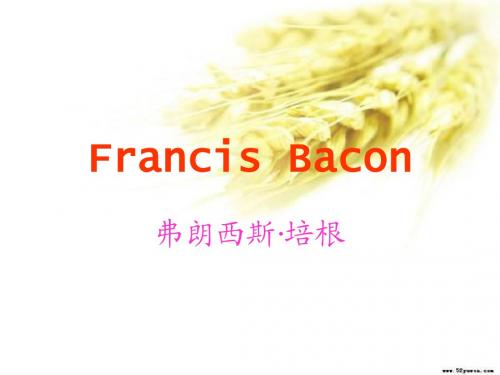
弗朗西斯· 培根
代表品
• • • • • 《新工具论》,1620年 《学术的进展》,1605年 《论说文集》,1624年 《各家哲学的批判》 《 培根人生论》
培根人生论
1597年,《培根人生论》在英国首版后, 即以文笔优美、语句简洁、趣味隽永、格 言精妙而大受欢迎,多次再版重印,历四 百多年而未衰,被译为世界上几乎所有文 字。2000年还被美国公众评选为最受喜爱 的十本著作之一。它与《蒙田随笔》、 《帕斯卡尔思想录》一起,被人们誉为欧 洲近代哲理散文三大经典。
评论
• <培根人生论 >属于为数不多的应当咀嚼消 化的书。你很难见到在这么小一个盘子里 盛这么多肉, 而且烹制得如此色、香、味 俱全 。 ----威尔.杜兰特 • 培根是一个兴趣广泛的人,有文艺复兴之 风,他以《培根人生论》闻名于世。 ----贝兰特.罗素
- 1、下载文档前请自行甄别文档内容的完整性,平台不提供额外的编辑、内容补充、找答案等附加服务。
- 2、"仅部分预览"的文档,不可在线预览部分如存在完整性等问题,可反馈申请退款(可完整预览的文档不适用该条件!)。
- 3、如文档侵犯您的权益,请联系客服反馈,我们会尽快为您处理(人工客服工作时间:9:00-18:30)。
Francis Bacon and His WorksFrancis BaconFrancis Bacon(1561—1626)was one of the leading figures in natural philosophy and in the field of scientific methodology in the period of transition from the Renaissance to the early modern era.He studied at Cambridge (Trinity College) and Gray's Inn, entered Parliament, and gradually established his reputation, but made little progress during Elizabeth's reign.WorksFrancis Bacon left vast and varied writings, which might be divided into three great branches:Scientifical works — in which his ideas for an universal reform of knowledge, scientific method and the improvement of mankind's state are presented.Religious/literary works — in which he presents his moral philosophy and theological meditations. Juridical works — in which his reforms in Law are proposed.ContributionsFrancis Bacon had made great contributions on Literature, Philosophy, Science, law and art. Literature:Francis Bacon’s literatur al work mostly are proses and essays. There are some features of Bacon's essays: ①the language is very neat, pretty and weighty. ②the sentences are very short. Bacon also likes to use more co-ordinate conjunctions than the subordinated ones, such as "as, since, because". ③the devices are parallelism, epigrams(警句), metaphor,and simile.And his most important work is Essay, which was regarded as one of the greatest prose works in the world for its brevity, compactness and powerfulness. Essay covers a wide variety of subjects, such as love, truth, friendship, politics, economy, religion, beauty, studies, and marriage.Of TruthⅠ Brief Introduction●First published in 1625●Francis Bacon declares that truth in the philosophical and theological sense, as well as honesty in thecivil business sense, are the "sovereign good of human nature."Ⅱ Background Information“What is truth?” said jesting Pilate (Full name: Pontius Pilate)●According to the new testament scripture, at first, Pilate thinks Jesus is innocent, for he had questionedJesus for many times. But under the pressure of the jewish religious leaders, Jesus was sentenced to death.●In the conversation between Pilate and Jesus, Pilate asked,''what have you done?'' Then, Pilateasked:“What is truth?”●Actually Pilate knew Jesus was innocent but he still asked , “What is truth” . At that time a lot of peoplelike Pilate, they do know what is truth but they pretend they don’t know .●Bacon uses this Bible story to introduce his topic——truth. He wants to tell people what is truth andwhat attitude should we take towards truth.Ⅲ TopicThe inquiry of truth, which is the love-making or wooing of it, the knowledge of truth, which is the presence of it, and the belief of truth, which is the enjoying of it, is the sovereign good of human nature.Ⅳ Sentences Analysis1. “But it is not only the difficulty and labor, which men take in finding out of truth, nor again, that when it is found, it imposeth upon men's thoughts, that doth bring lies in favor; but a natural though corrupt love, of the lie itself.”●Up to this point Bacon is saying there are few philosophical skeptics left but humans still prefer thefreedom to choose their own views over the hard work of pursuing truth especially since they consider truth constricting.2. No advantageBacon writes “One of the later school of the Grecians, examineth the matter, and is at a stand, to think what should be in it, that men should love lies; where neither they make for pleasure, as with poets, nor for advantage, as with the merchant; but for the lie's sake.”3. AdvantagesBacon writes “A mixture of a lie doth ever add pleasure. Doth any man doubt, that if there were taken out of men's minds, vain opinions, flattering hopes, false valuations, imaginations as one would, and the like”4. DisadvantagesBacon writes “but it would leave the minds, of a number of men, poor shrunken things, full of melancholy and indisposition, and unpleasing to themselves?”5. “truth, which only doth judge itself, teacheth that the inquiry of truth, which is the love-making, or wooing of it,”●“yet truth, which only doth judge itself” means that “that truth seeking faculty is the sole judge of truth.”●In “the love-making, or wooing of it” Bacon means the happy match between the mind of man and thenature of things.”6. “The first creature of God, in the works of the days, was the light of the sense; the last, was the light of reason.”●Bacon believed that God gave us our senses to determine truth be he also believed God gave us theability to reason to determine truth.Ⅴ Beautiful Sentences1.But I cannot tell; this same truth, is a naked, and open day-light, that doth not show the masks, and mummeries, and triumphs, of the world, half so stately and daintily as candle-lights.余亦难言究竟,唯思真理犹如白日无遮之光,直照人世之歌舞庆典,不如烛光掩映,反能显其堂皇之美。
